On New Years Day 1863 Elisha Bassett writes to “Cousin Henry” from Boston. Elisha gets right to business, offering no opinion in answer to a question Henry had apparently posed regarding savings banks but answering questions for Henry about current government bond yields. Bassett refers to “Uncle Frank” as the potential investor in the bonds he describes, and mentions the hassles associated with getting his money to Boston and then redeeming the interest coupons of the bonds. Uncle Frank is Henry’s father-in-law Francis Bassett. Henry married Julia Bassett in June 1856 when he was 39 and she was 33. Later in the letter, Bassett sends his “best regards to cousin Julia.” Although marriage to Julia might have been enough for Bassett to consider Henry a cousin, there’s an additional connection. Bassett’s mother Fanny Sears Bassett was the sister of Henry’s mother Achsah Sears Ranney. Bassett also mentions “It affords me pleasure to hear that your mother is still living & in comfortable health.”
Bassett says he is surprised to learn that Henry’s son Ralph has gone to fight in the Civil War. Ralph was only 17 at the time when Bassett wrote, and he was already in Company F of the 34th Regiment of Massachusetts Volunteers. The 34th was mustered in Worcester in August 1862. At the time Bassett wrote the regiment was guarding Washington D.C. From the summer of 1863 to the end of the war in 1865 the regiment fought in eight battles and lost 269 men. They were present at the Battle of Appomattox Courthouse on April 9, 1865 and at the surrender of Robert E. Lee. The regiment was mustered out of service in June 1865. Ralph survived the war.
My transcription follows the images:
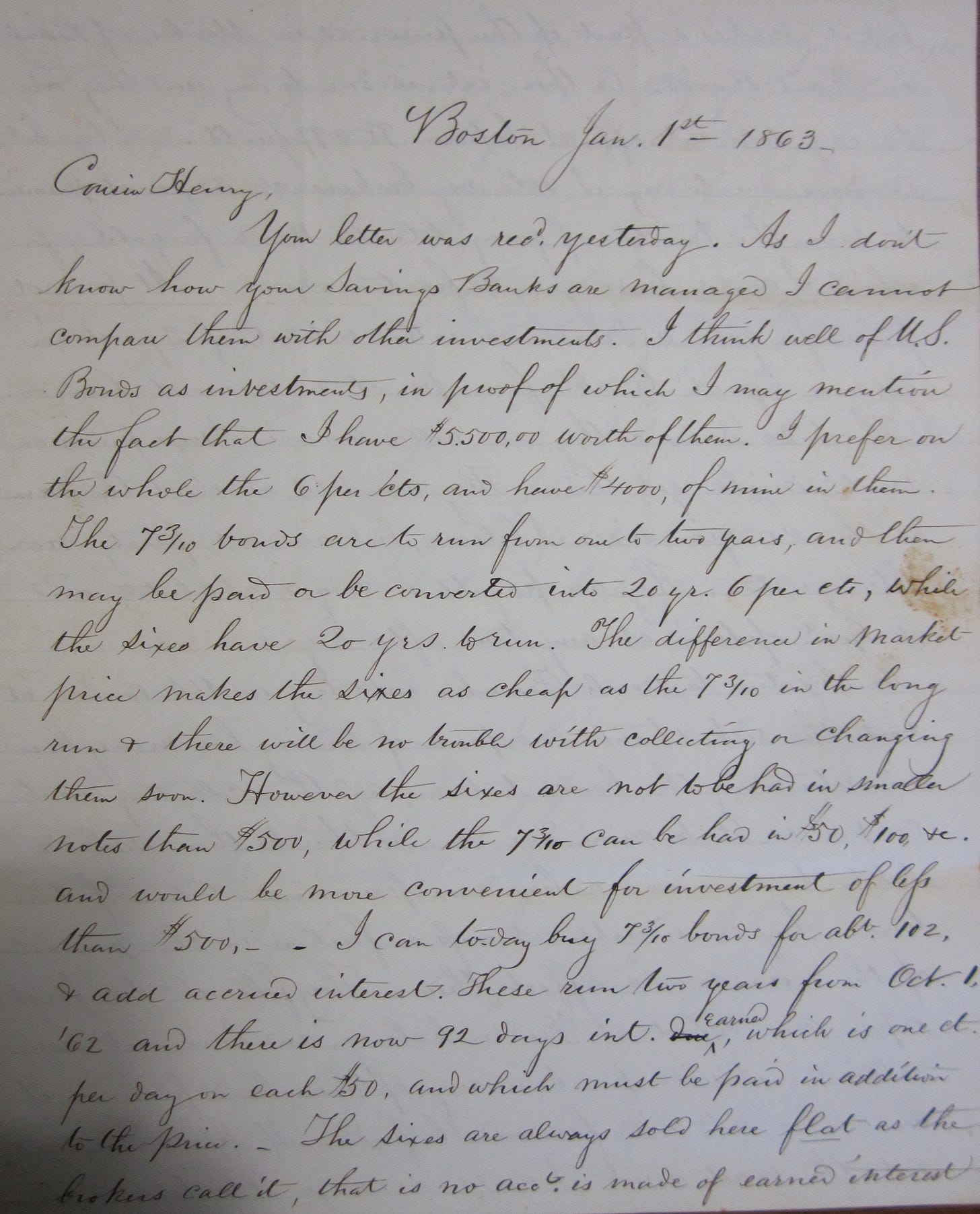
Boston Jan. 1st 1863
Cousin Henry,
Your letter was rec’d yesterday. As I don’t know how your Savings Banks are managed I cannot compare them with other investments. I think well of U.S. Bonds as investments, in proof of which I may mention the fact that I have $5,500.00 worth of them. I prefer on the whole the 6 per cts, and have $4000 of mine in them. The 7 3/10 bonds are to run from one to two years, and then may be paid or be converted into 20 yr. 6 per cts, while the sixes have 20 yrs to run. The difference in market price makes the sixes as cheap as the 7 3/10 in the long run 7 there will be no trouble with collecting or changing them soon. However the sixes are not to be had in smaller notes than $500, while the 7 3/10 can be had in $50, $100, &c. and would be more convenient for investment of less than $500.
I can today buy 7 3/10 bonds for abt 102 & add accrued interest. These run two years from Oct. 1, ’62 and there is now 92 days int. earned, which is one ct. per day on each $50, and which must be paid in addition to the price. The sixes are always sold here flat as the brokers call it, that is no acct. is made of earned interest but it makes a part of the price, as in stocks of Banks or Rail Roads. On them interest is due today, and they are today sold in. off at between 98 and 99 per ct. My interest coupons today I sold my brokers at 33 per ct. premium to save the trouble of going to Custom House for gold, for which I could have got a fraction more. At present prices for gold a dividend, or rather interest of 3 per ct in gold is equal to abt four per ct in current funds. The 5.20 sixes as they are called come in $100.00 pieces and Uncle might get them. They are sold at about the same as the 20 yr sixes I believe, but are not plenty nor often quoted. They are payable in 20 years absolutely and at Govt option any time after 5 yrs.
The objection to Uncle Frank’s investing in U.S. Bonds is the risk & trouble & expense of sending his money here and returning the bonds to him, and then collecting each coupon as it came due &c. I think them safe & likely to command a handsome premium at some future time. Any considerable success or failure in the prosecution of the war would affect them. They fell abt two per ct. upon our defeat at Fredericksburg, and have not since rallied. I will purchase any of these bonds for him if he wishes, and will forward the funds. If his money was not the exact amt I could arrange it and balance it afterwards.
A great many capitalists avoid Govt Bonds entirely, and will let money on good mortgages, or on City of Boston Bonds at 5 per ct. instead. A good six per ct. mortgage where interest was sure every six months, would be perhaps better than Govt. Bonds, but they cannot be had here now.
I was surprised to learn that Ralph had gone to the war. I did not imagine that he was old enough. I am glad that he has not been exposed any more so far, and I hope no harm will befall him. It affords me pleasure to hear that your mother is still living & in comfortable health.
Tell Uncle F. that I should be happy to have a visit from him in Boston, and then we will see about his investments. We are well. Call on us whenever you happen this way. I have never had the pleasure of introducing you to my present wife. I hope to visit my Ashfd. friends again at sometime.
My best regards to cousin Julia & all my good friends in Ashfd. & believe me, as ever
Yours truly Elisha Bassett
H.S. Ranney Esq.
Ashfield Mass.
P.S. I have written in haste & I presume have written particulars that you knew as well as I, but it is no matter if I have if I have made myself intelligible. E.B.




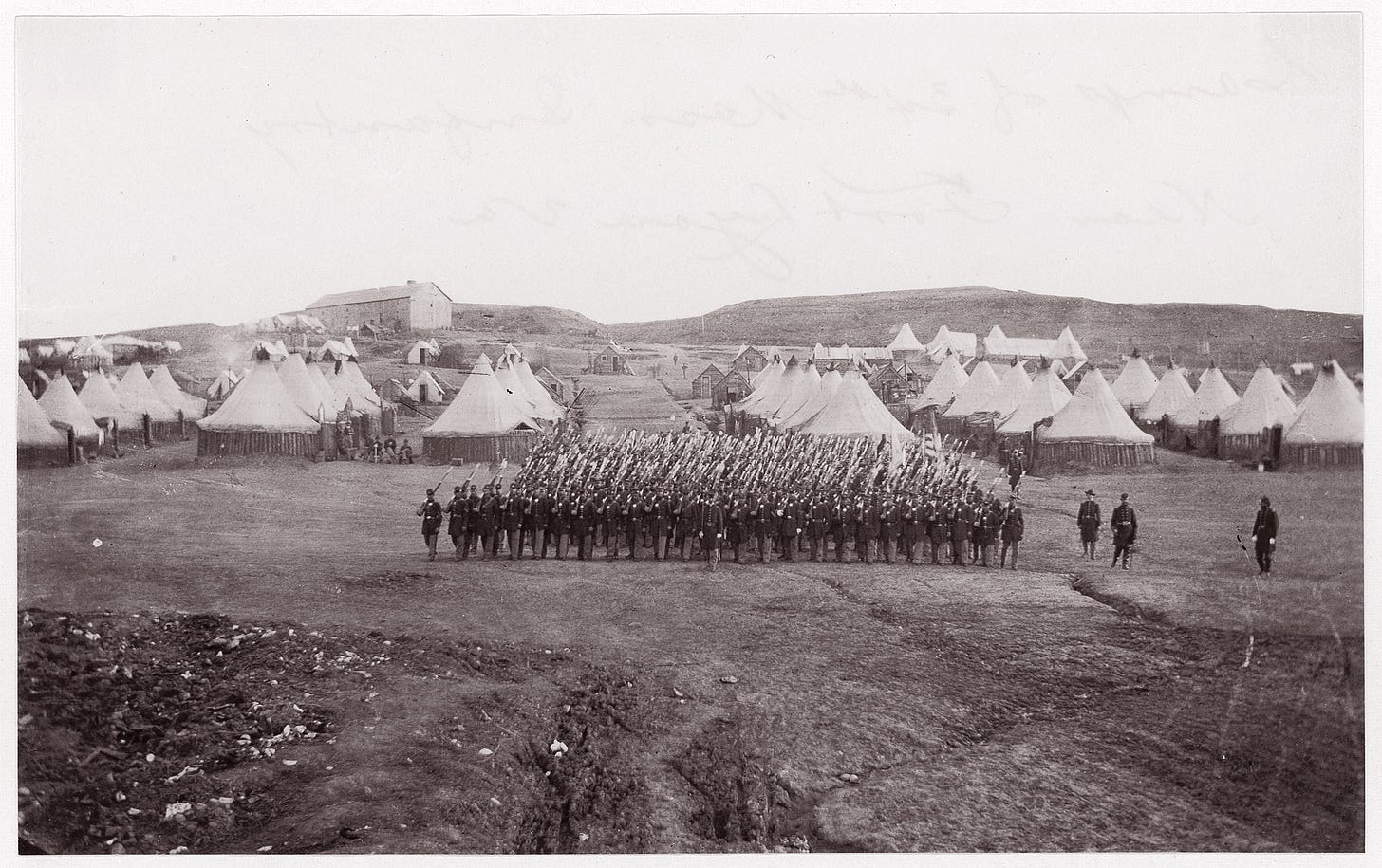
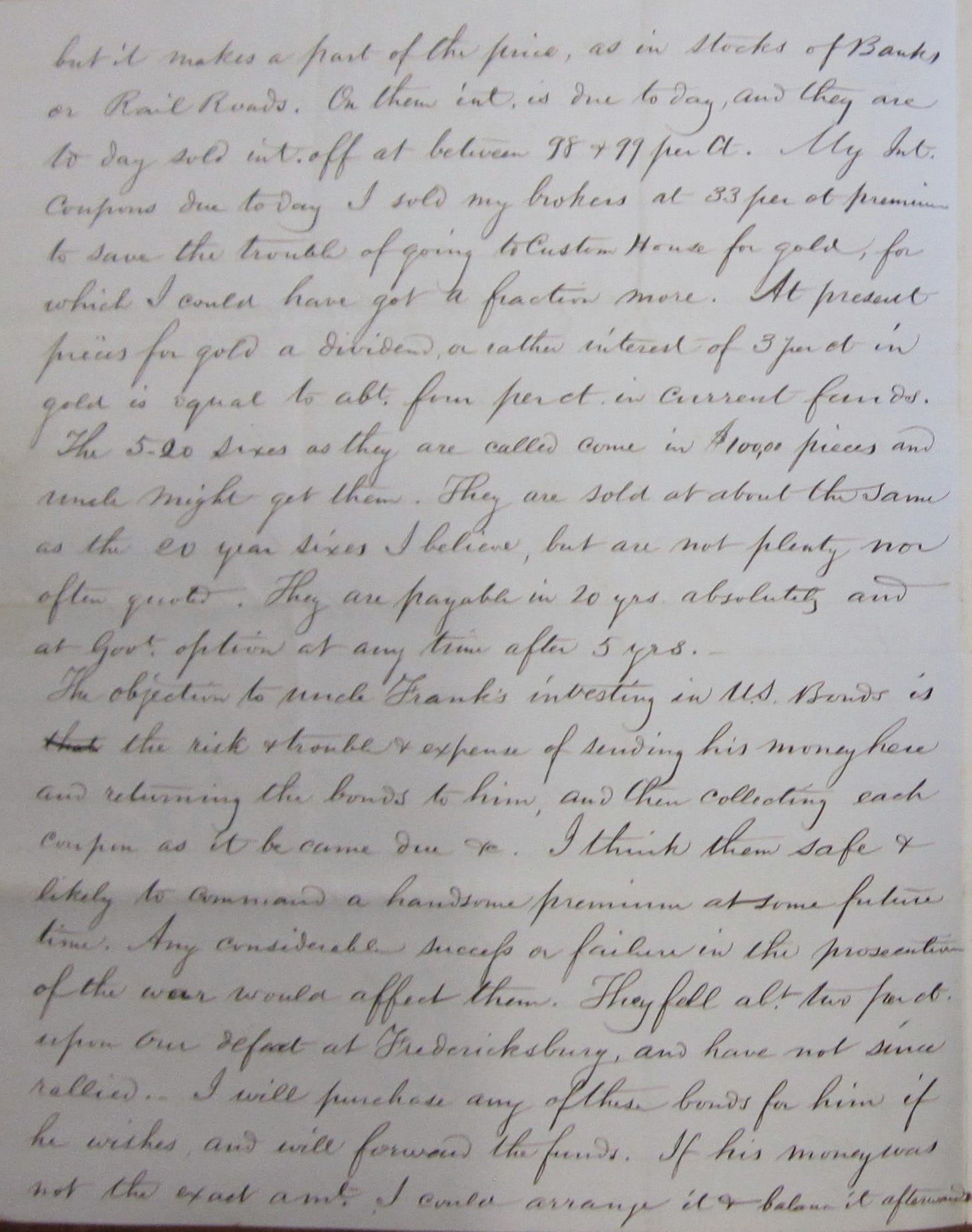
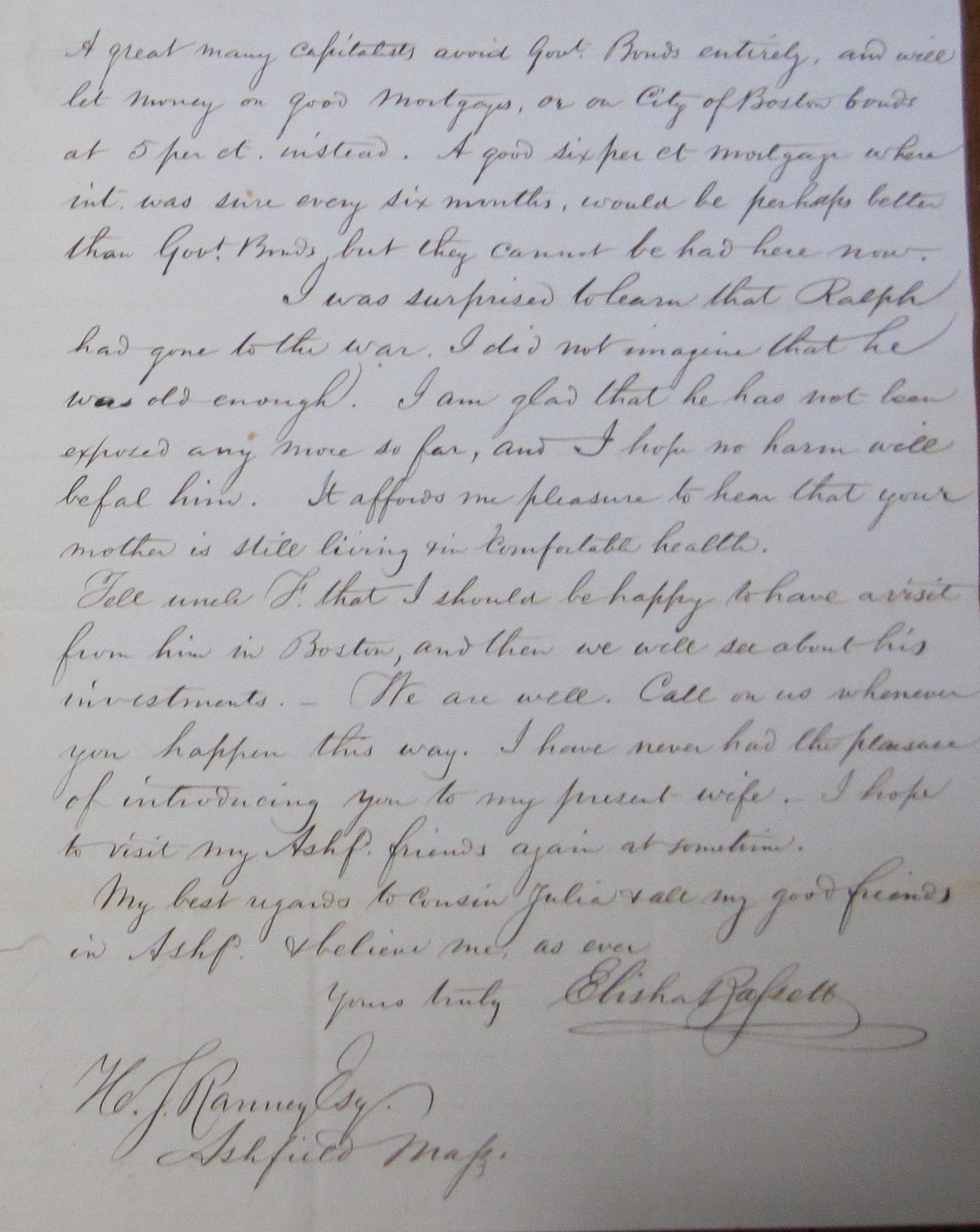
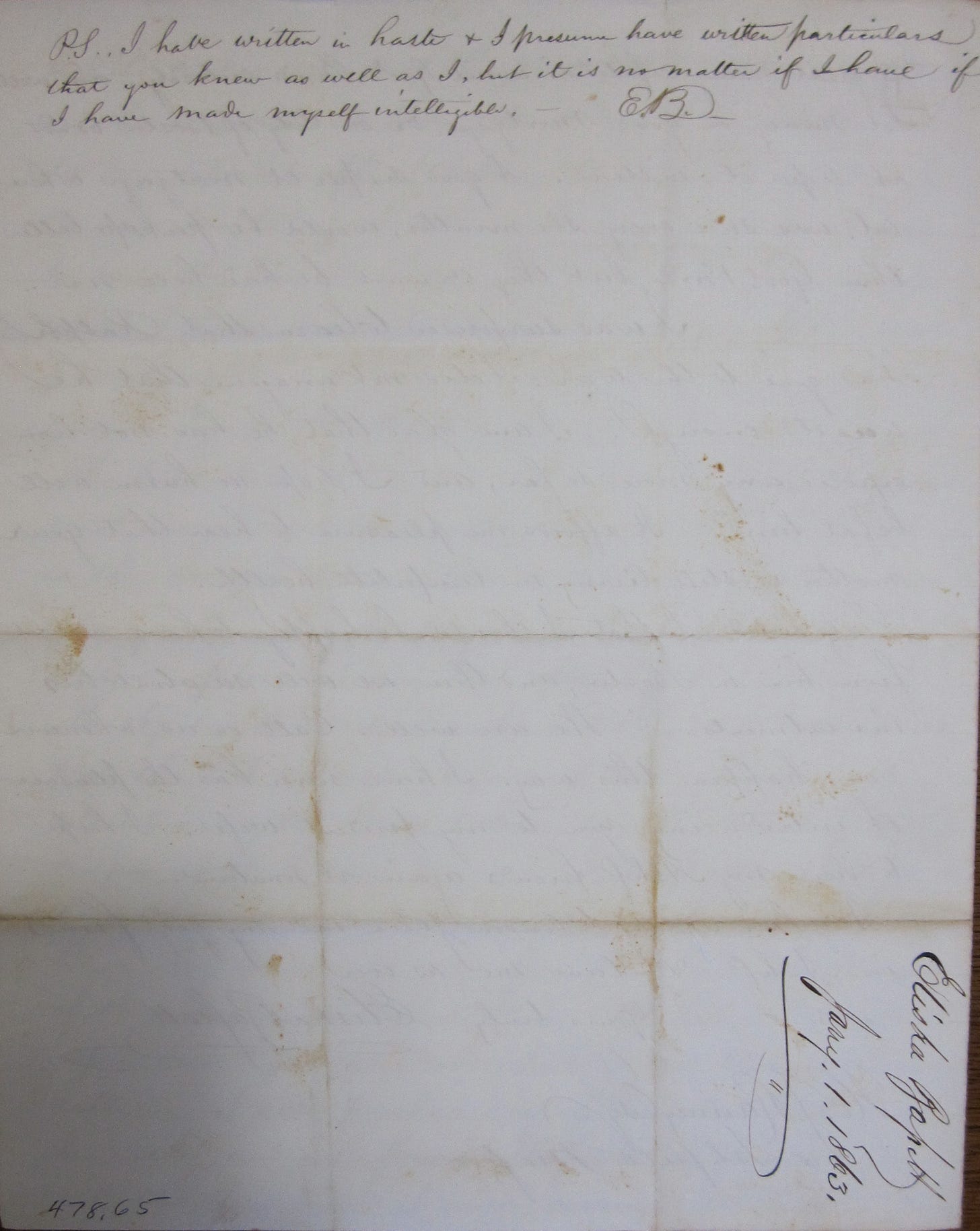
How did they get so wealthy? I can't find how much $5,500 in 1863 would be in today's dollars, but if it were 1913, would be $169570 in 2023 dollars.
It's interesting too, that with the Civil War going on, they are worrying about bond interest paying out in 20 years!
[Inflation Calculator | Federal Reserve Bank of Minneapolis](https://www.minneapolisfed.org/about-us/monetary-policy/inflation-calculator)